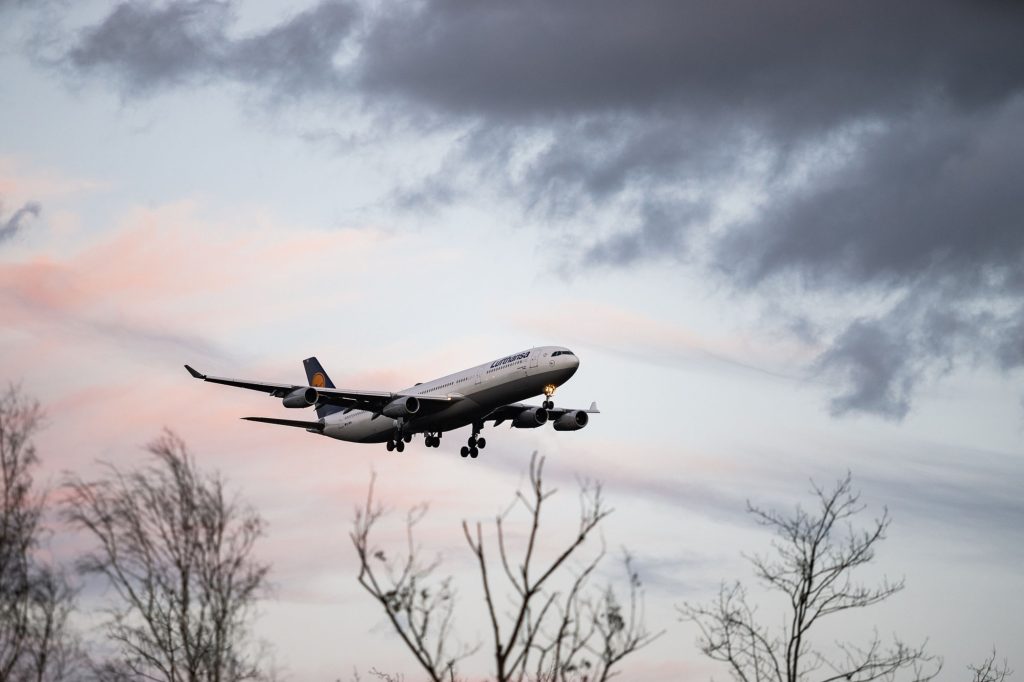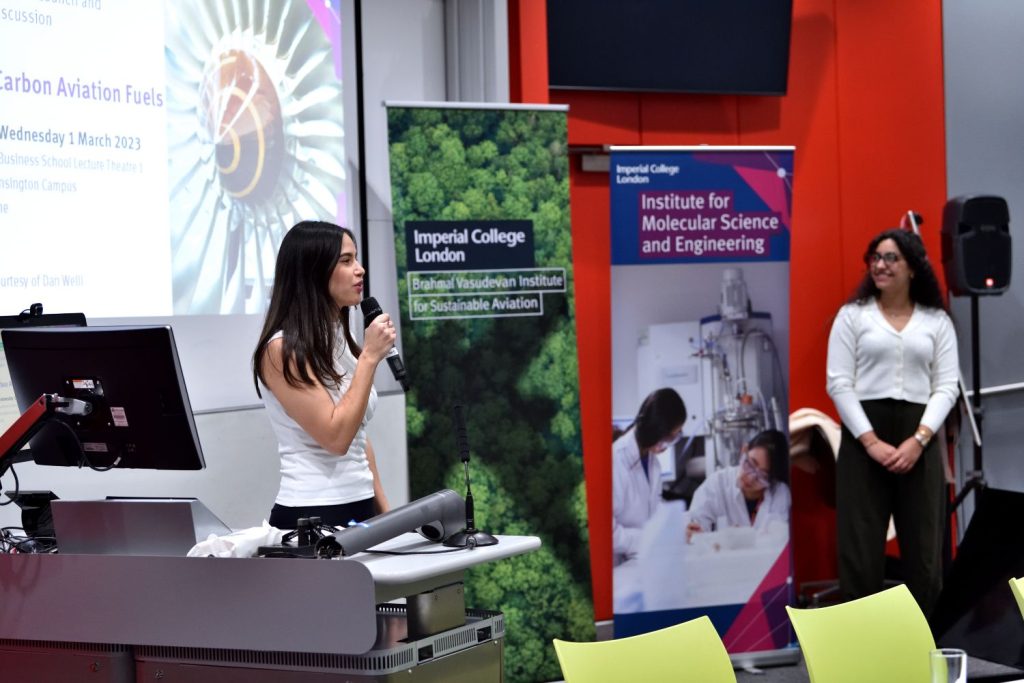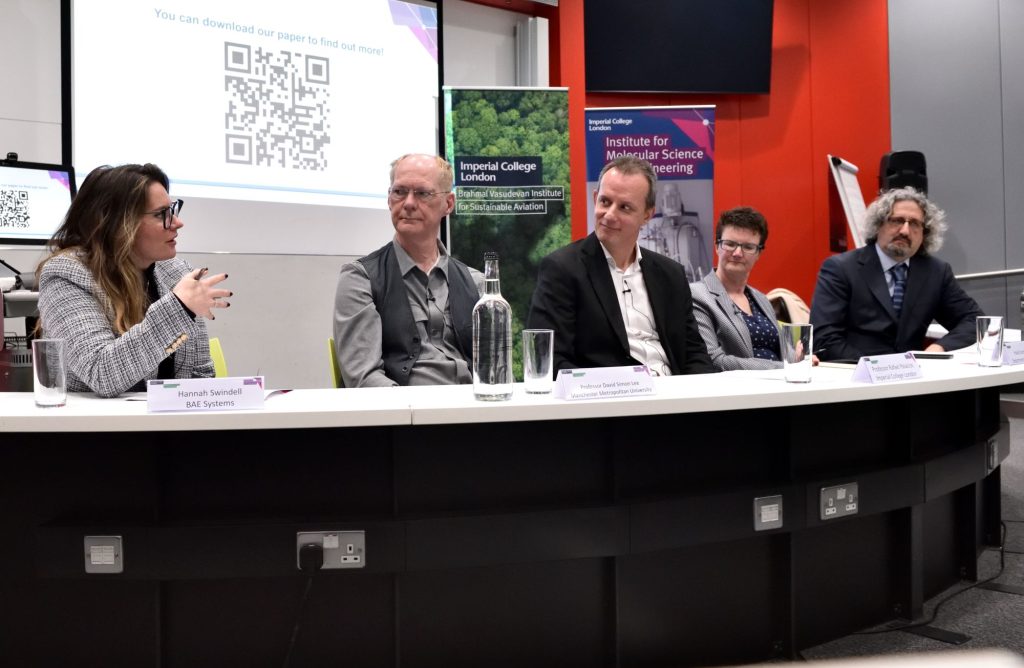On 1 March 2023, IMSE launched its ninth briefing paper, on low carbon fuels for aviation. I have been working with a great team of postdocs and PhD students on this for the last year. It was exciting to hear what a professional audience thought of our work at last.
What are sustainable aviation fuels?
Sustainable aviation fuels (SAF) are used instead of kerosene to power an aircraft. The fuel types most discussed are hydrogen, power-to-liquid fuels (synthetic fuels) and biofuels. All of them in theory reduce emissions of CO2 compared to kerosene, but as we showed in the paper, it depends on how they’re produced and how their emissions are measured… and it doesn’t take account of non-CO2 emissions. The effect of these on climate is estimated to be 2-3 times greater than CO2 alone.
This is a topic that has been in the news repeatedly over the last year. In November 2022, Airbus and the RAF announced the completion of the first 100% biofuel powered flight in UK airspace. The January 2023 independent review of Net Zero by Chris Skidmore MP identified aviation as one of the sectors where the UK is falling behind on its decarbonisation targets. On 28 February 2023, the Royal Society launched a briefing paper this topic, Net Zero aviation fuels. So IMSE’s briefing paper contributes to a live debate.

Barriers to using low carbon fuels for aviation
All three of these fuel types are currently more expensive that kerosene. And all have significant drawbacks when it comes to rolling them out to the current UK fleet. For example:
- Biofuel feedstocks are limited, and could replace less than 20% of total fuel demand.
- There are no full-size power-to-liquid fuel plants anywhere in the world at the moment.
- Hydrogen cannot be used in a standard jet engine, and aircraft need to be redesigned in order to incorporate hydrogen fuel tanks.
Finally, both green hydrogen and power-to-liquid generation require low carbon electricity. Not enough of this is produced in the UK to power aviation at the moment, so there needs to be extra capacity in addition to current UK power demand.
Launch event
As always, IMSE organised a launch event with a panel discussion, where representatives from industry, academia and government could debate the implications.

Hannah Swindell of BAE Systems noted that all new fuels need certification for use in aircraft, and this takes time. She also acknowledged that the supply chain isn’t there for these fuels yet.
Hazel Schofield of the Department of Transport talked about the need to balance all the different alternative technologies to achieve the right result. The UK is developing a sustainable aviation fuels mandate to encourage production of these types of fuel, but this is not finalised yet.
David Simon Lee, professor of Atmospheric Science at Manchester Metropolitan University explained some of the complexity of the non-carbon emissions from aviation. This includes nitrogen oxides (NOx), and water, which forms ice crystals around soot particles, generating contrails. The exact emissions impacts of these new fuels in aviation are still largely theoretical. There have been so few flights powered with these fuels these effects have not yet been directly measured.
Multidisciplinary work is essential
David Lee and Hazel Schofield both commented on the need for multidisciplinary working in both research and government to develop low carbon fuels for aviation.

David said:
“We have to continue to study processes at the process level, but we have to join these dots and understand each other. I’m working at the moment with a soil carbon specialist in New Zealand, and a transport geographer, on SAF. They don’t understand what I’m talking about. I don’t understand what they’re talking about. But we’re having to thrash it out. And we have to keep challenging ourselves.”
Hazel said:
“We have to work with everybody to progress the policy. All of the work that we’re doing is absolutely founded in the Net Zero policies, which [is] in a different department to us. Obviously, it’s also in our wider aviation policy which sits in a different team to us. This is about cross-government working from a policy point of view. To the best of our ability, that is exactly what we do, constantly reviewing things with different teams, how these things fit together, trying to resolve differences in approach and different priorities. How do you assess this priority against that priority? That’s all very difficult and ultimately becomes political at that stage. But I think a government probably does have quite a machine that’s already designed to try and do this.”
Next steps
We’re grateful to everyone who came to the launch, downloaded the paper, shared it on social media, talked about it down the pub… please keep doing this! The government has now opened a consultation on the Pathway to net zero aviation: developing the UK sustainable aviation fuel mandate. We’re going to keep contributing our expertise, to help the UK take some good decisions on reaching net zero.
What do you think? Do you think net zero is achievable for aviation? What did you think of the paper? Get in touch and let us know.
Read more about multidisciplinary work on fuels at Imperial: A simple guide to solar fuels 1 – turning sunlight into a fuel